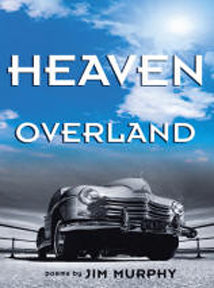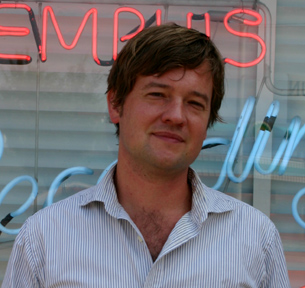Murphy's
Law: On the Road Again
by David M. Story
“In Jim Murphy’s
America, a blessed music is anywhere. It is everywhere. It bears us home.”
--
Jake Adam York

It
seems cliché to play off of the phrase "If it can go wrong, it will go
wrong," but realistically speaking, it’s undeniable that for travelin’
man and poet Jim Murphy, when it comes to writing poetry, if it can go
right, it does. Murphy has hit the mark again with his latest collection
of poems, Heaven Overland, an ode to the communal and historical
geography of our land, a route-inspired topography that has mapped his
growth as an Alabama poet.
Heaven Overland
(Kennesaw State University Press) has proved for Murphy to be a journey,
not from east to west, but from the inner self to the outer realty. For
the past half-century, America's poetry has been largely based on ego
and personhood, to the extent that almost every poem seems to be
confessional, or at the very least autobiographical. By contrast, in
this new collection Murphy explores a new and different poetry of
community and environment, a geographically "civic" poetry of
conscientiousness.
James Howard Kunstler wrote in The Geography of Nowhere that "a
suburbanite could stand in on her law for three hours on a weekday
afternoon and never have the chance for conversation." Not so in
Heaven Overland. Murphy stands on the corner of Main Street and
takes us everywhere, complete with inner dialogue and outward
commentary. |
WLM:
The sections on Heaven Overland are titled by "Route" numbers.
Tell our readers about a memorable cross-country trip.
JM: The highway has always been a source of inspiration for me,
poetic and otherwise. One of the most memorable trips I've taken was
when I moved to Cincinnati from Lawrence, Kansas. A buddy of mine drove
my car, and I drove a little U-haul from Kansas to Ohio in a day, and
then promptly drove down to Baton Rouge, Louisiana before shooting over
to Austin, Texas. Then I drove up Highway 61 and cut across the Natchez
Trace through Mississippi, then up to my folks' house in Illinois. After
a few days I drove back to Cincinnati. It all seemed so easy! I was only
twenty-three at the time, so I guess it was. I think even a single leg
of that trip would be tough now! It's funny, because that rough circle
pretty much covers the territory, which I'm most interested in, in my
poems, which is that North-South axis along the big rivers.
WLM: Is "The Family Cadillac for Sale" autobiographical -- did
your parents drive a caddy on a road trip?
JM: My folks drove a Pontiac, an AMC Hornet, and then a Plymouth
K-car. I don't think I've ever even sat in a Cadillac! You can't really
get at America through the metaphor of a K-car. Well, maybe you can.
It's a different world now, isn't it?
WLM: How did a poem like "Spectacles of 1906" about distinguished
educator W.E.B. DuBois, end up in a spatially-oriented collection of
poetry?
JM: I've always thought of DuBois as a signal influence, across
both space and time. In The Souls of Black Folk he essentially
outlines the ideas that will infuse soul music fifty years later. He
includes bars of spirituals as partial epigraphs for each chapter,
perfect for the new African American vision of culture he's describing.
He's got a comprehensive view of sociology and economics as well, and so
you can see in that book so much of what's to come. I think he's a
prophet, really. And so in a way, like Whitman or Dickinson, a
forecaster, a proto-modern, what have you. That particular poem is about
the horrific irony of a time when he lived in Atlanta as the city went
through a race riot. Here was DuBois, coming up with a truly generous
and broad vision of culture, uniting all these cultural strains that had
been ignored or dismissed to that point, propelling a positive image
into the future, and he walks out of his front door into racial
violence, lynchings, the worst human beings can do to each other.
WLM: "Twentieth-Century Limited" and "A Monday Night Date" are so
sparse compared to some of your lengthier, more narrative poems. Which
form are you more comfortable with?
JM: I begin equally uncomfortably with any of them! But I can say
that some subjects seem to ask for deeper or longer treatments. The two
you mention here are a goodbye postcard to the last century and a little
lyric that caps on an Earl "Father" Hines song, so it seemed right to me
to keep it short in each case. If I'm lucky, I've chosen a space that
fits the program and feel of the poem. You never know how that's going
to work out, but you can recognize the key moments where you need to
close something off or open it up accordingly.
WLM: "Stag Hollywood" appeals to film buffs -- is that an
interest of yours and would it be too much of a stretch to glimpse a
little bit of Day of the Locust in this poem?
JM: I appreciate well-made movies as much as anyone. That
particular one is about a silent movie actor named John Gilbert, who
suddenly finds himself out of work in the talkie era because his voice
is so tinny. It's really a kind of tragic thing. As far as Day of the
Locust goes, there is a warping of personality involved, a kind of
seedy fantasy that Hollywood can infamously hand out and take away, so
there is a connection in a sense, though it's not direct. The whole city
seems to be a dark theme park.
WLM: As for "Sarah Vaughn's Voice," tell the readers what your
favorite Sarah Vaughn song is and then compare this poem to "Twilight
Call Louis Armstrong Park."
JM: "I Cried for You" has that great lyric "Every road has a
turning. / That's one thing I'm learning." I love that one. That's
probably my favorite of all. That poem is very personal, about a couple
traveling together and going through changes together and finding their
way back to each other despite -- or because -- of it all. The other one
is a meditation on the beginnings of jazz in Congo Square in New
Orleans. It used to be that guidebooks warned you to never, ever go to
Louis Armstrong Park in New Orleans because of the high street crime in
the area. That's where Congo Square is, the place where the slaves of
New Orleans could play their African rhythms on Sundays, where true
African American music originated, if you can say it originated anywhere
-- jazz, blues, rock and roll -- right there.
WLM: "Night Visitation" is a compelling poem -- is it
autobiographical? What was its genesis?
JM: We all serve our students well, and we all do them wrong,
from time to time. When you half-listen to questions because you're
thinking about what the dean wants you to do that day; when you lose a
page of someone's short story; when you do the automatic thing instead
of the genuine thing -- that's doing them wrong. And it's unavoidable.
It's nothing conscious or malicious, either. Fortunately, if we're good
teachers, it's rare. That metaphor came to me suddenly and powerfully.
"Thumbing through my ... suits" seemed right on target for students who
learn your tricks, figure you out, the weaknesses and the strengths. And
most often these are the ones most like you -- almost mirror images of
yourself.
WLM: Route 66 is for many boomers an all-time favorite
television show. Have you seen it?
JM: I've never seen it! I love the Bobby Troup song. There's a
version of it on the Rolling Stones' December's Children album, a
weird live version where all you can hear is bass and screaming. It's
hilarious the way Mick Jagger tosses off all these American place names
-- "Flagstaff, Arizona, don't forget Winona" -- with probably no idea
where in the world these places are!
WLM: Tell the readers about the last poem in the collection,
"Dual Jazz Funeral."
JM: It's a
really important poem for me because New Orleans has a funereal cast all
the time. There's always the presence of so many ghosts to contend with,
even on a good day. They exist in the architecture, in the trees, even
in the weather. I think this awful, slow, oscillating rhythm between
life and death and life is a reality for many people there,
psychologically, economically, spiritually. This is the most American
city, and principally because it's this terrific mixture of things
people don't think of as American. We've always been bad at respecting
ourselves, our history, where we come from. The response to Hurricane
Katrina is a national case-in-point. That poem is a somber note for
closure, and nothing about it invokes Katrina or politics specifically,
but rather, it comes out of a place like Emily Dickinson described:
"After great pain, a formal feeling comes." It's a lyrical march through
those emotions. The duality is the same as the second line march, too.
You walk a slow, reflecting path out to the gravesite, and there's a
raucous celebration of life on the way back home. People tend to focus
on one or the other when it comes to this, but you need both to make
sense of the ritual. Maybe that's the way forward, and not just for New
Orleans.

Journalist, historian,
and academic Henry B. Adams once said “American society is a sort of
flat, fresh-water pond which absorbs silently, without reaction,
anything which is thrown into it.” This saying might well serve as
metaphor for the evolution of Murphy’s work into what is a sense of
community and belonging and even more broadly a national sense of
interconnectedness and civic-mindedness.
For Murphy, the seeming tranquility beneath academia has,
without reacting, absorbed both his life’s cross-country travels and
interior contemplations, resulting in a spatial exercise that transcends
traditional poetry and becomes a hypsometry underlining one man’s
emotional journey down Route 66.
University of Montevallo professor Jim Murphy serves on the
Montevallo Literary Festival committee and contributes poetry to Red
Mountain Review. His first book,
The Memphis Sun, was published by Wick Poetry Chapbook Series. |

